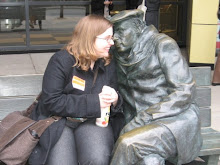For this Thanksgiving weekend, since I doubt there is much Canadian programming going on (I have chosen to listen to music and clean instead of watching TV), what is better than to take a look at Canadian history?
I just finished reading J.L. Granatstein's "Who Killed Canadian History?" and it is a really interesting read. For the most part, I find myself agreeing with him though at times, I feel dirty about it since he can go further and ends up sounding like my father or grandfather. Basically, the argument is that Canadian history is not being taught in schools as much as it should be and that when it is taught, it's not done properly. Mostly it's now through the many social, politically correct lens that permate academia. So we don't learn so much about the different battles of WWI but the roles of women and minorities during the war. Who needs to learn about a bunch of old dead white men anyway?
The problem with this? Most of the history is made by old dead white men and it's hard to ignore that. Yes, we need to learn about those who didn't have any power and what they still managed to accomplish that but I don't think we need to throw out all the facts that those old men did too. It needs to be taught in context, to understand why there were no 'mothers' of confederation but still teach who the fathers of confederation were too.
The other really interesting point that he raises and I agree with him on the most part (I'm hesitant with how far he goes with some of the examples sometimes...) is that Canadians have a habit of painting our history with the darkest brush. We never commited any sort of genocide. We didn't start any major wars. We fought when we needed to fight but we didn't go killing sprees all the time. Yes, there are blemishes on our record and these need to taught. But there is no way that the fact that we turned away Jewish immigrants during WWII makes us as bad as the Nazis. We should be proud of our history when compared with those of other nations, instead of trying to bring ourselves down to their levels. It's like being the smartest kid in school but not wanting to draw attention to it so we downplay our marks. That A doesn't really mean anything. Yes, the treatment of the Natives was terrible. But did we try to turn it into a genocide? No (well, not actively anyway. The diseases the Europeans brought weren't exactly a great welcoming present). There just needs to be a better perspective on our history.
I think the best way to put is, in Granatstein's words, we have "a generally usuable past" and we need to utilize it properly.
Sunday, October 11, 2009
Subscribe to:
Post Comments (Atom)

Ah, context. Schools are no good at context, its either this way or that way. It is great to see things through different lenses, but it does seem to leave me staring blankly when people talk about World Wars and I can really only comment on Japanese internment and woman workers.
ReplyDelete